
Imagine my surprise when I picked up the phone and heard, "We can meet Don Burgett next Thursday. Bring your book, he will sign it. Can you be there? He says the morning is best for him." Well I must admit it took me a moment to compose my thoughts, but it didn't take long for me to say, yes! So how did this meeting come to be? Read on...
In the midst of trying to help Art Morneweck get more info about the his brother, Robert, a member of the 101st Airborne who died while crossing the Rhine, I posted some info on a couple of forums and a gentleman recommended that I read Don's book, Across the Rhine. When the book arrived I told Art that he should also read it and he informed me that he had received an email from Don Burgett and Don Straith several months ago regarding the circumstances of Robert's death, and sent me copies of the letters (see below). He had not read any of Don's books at that point in time and I suggested he get Across the Rhine first as it pertained to Robert's tour of duty.
At that point unbeknownst to me, "Papa" Art had phoned Don and arranged for us to meet with him and talk about WWII and Robert since they were both in the Co A. He told Don about my father and my project with VI Corps Combat Engineers. Don was gracious and invited us to his home in here in Michigan. What an honor.
The following are excerpts taken from his books and from our three hour meeting in the country home he built for he and his family. My thanks to you and your very sweet wife Twyla for your warm hospitality. It will be a day long remembered.
Marion's note 03-25-2017 - Again sad news graces
yet another veteran's page on my site. Don passed away on 3-23-2017 at 6 PM,
and joins all our heroes in the universe. While distressed upon hearing of your
death, I am one of the fortunate ones who actually got to meet with you on many
occasions, become friends, share in your stories, meet some of your family, and
proudly display your signed books and photos in my home. Always remembered and
never to be forgotten.
RIP, Marion

Letters to Art from Don Burgett and Don Straith
Hello Art!
Joe Beyrle forwarded your email concerning your brother to me, as I was in Company A at the time of your brother's death, although I didn't actually know him.
As you know, Bob died on our Rhine crossing the night of April 11-12, 1945, but he wasn't killed by enemy fire. On our return crossing of the river, we came under fire from a German 88mm cannon sending air bursts above the river. Whether due to this or overcrowding, I can't say, but two of our boats overturned and seven men were lost, one of whom was your brother. Those men were originally listed as "Missing in action", but that was changed a week later to "Killed in action". I have copies of the report listing their names and would be happy to send you one or drop one off when I am on that side of town, if you wish (I live... address left off for privacy). If you would like a copy of my account of the raid from my memoir, I'll be happy to provide that, also. In addition, in my company photo album, I have one group picture that I believe includes Bob. If you would like to meet for coffee sometime and I make that a positive identification, I will then have a print made for you.
There is one thing I'd like to know from you. Although the drownings occurred early on the morning of April 12, I have heard that some of the deaths are listed as April 18, the day the report was changed from MIA to KIA. What date was given to your family?
I look forward to hearing from you....
Don Straith
A-506-101
WWII
-----------------------------------
Dear Art:
I received your question from Joe Beyrle this PM. I was in A Co. 506 since Feb.,, 1944, that is before Normandy, through every battle to the last day the division was active. We did receive several replacement paratroopers into A Company after the 4th Armored broke through to us in Bastogne. Most of these men did not get onto our roster because of our combat situation and we older men did not get to know most of them by name. At least not well enough to retain their names throughout these many past years.
Company A did make a night crossing attack of the Rhine into the German town of Himmelgiest the same night that President Roosevelt died. Four of our men were killed outright on the other side, their bodies were recovered two nights later by one of our patrols led by Sgt. Jack Bram, now deceased. None of these men was your brother. On our return trip from the attack in assault boats we were shelled by German tanks that approached the edge of the Rhine. Several boats were overturned and several of our troopers were drowned, one of them from my squad named Alfred Corgan. Two other new replacement men in my squad were also drowned that night, their bodies were recovered several days later on the shore two miles downstream. I do not recall their names for they were among the new men that came to us as replacements when the 4th Armored broke into Bastogne.
However, I did find your brother's name listed in the KIA section of the 101st book, 'Rendezvous With Destiny', by Rapport and Northwood. I am very sorry that evidently one of the men that died that night was your brother and that due to circumstances of the battles that we were engaged in I did not get to know him better and that I cannot tell you more about him. Robert did conduct himself as a paratrooper and with bravery that is well associated with all paratroopers. All my best to you and yours.
Airborne,
Donald R. Burgett, Sgt. A Co. 506

First Meeting 12-16-04
(Photos at the Burgett's courtesy of Art Morneweck)
The 60th Anniversary of the Battle of the Bulge; what a day to meet a member of the famed 101st Airborne, 506th PIR. Our morning introductions began casually as we gathered around their kitchen table and gazed with amazement at deer cautiously stepping through trees on their back acres. We talked about the house he built, their children and grandchildren, the Battle of the Bulge, Stephen Ambrose, Tom Hanks and the Band of Brothers, and so much more while sipping coffee on a cold winters day. If you've read any of his four books, then you know what a good writer he is. In person he is a great talker and we could have stayed all day and listened to his stories.
He has a phenomenal memory and his wife Twyla says he doesn't forget ANYTHING. Art asked Don if he kept a diary. Nope, it's just all in his head.

Art asked him about the day that Robert died and Don told him about crossing the Rhine to Himmelgiest. They were sent across in boats and were supposed to be a "lure" for the Germans. Patton's several attempts to enter the area were always thwarted and members of Co A were to try and entice the enemy to attack them and therefore open a door for Patton's Army.
Well the attempt was successful, but not without loss of life and injury. Four men died in Himmelgiest and their bodies were later retrieved by some of the men from Co A. On April 12th they re-crossed the Rhine and this is where Robert lost his life. The Germans were firing at the 506th as they attempted to get to the other side. The river at this point was a mile across, the current swift, and the dark of night surrounded the soldiers. Somehow some of the boats overturned and several men drowned in the chilly waters. Don is not sure if it was due to overcrowding or if a shell has landed very near some of the rafts. Though the men tried to help their brothers, nothing could be done. A few days later a couple of the bodies turned up on shore quite a ways from the crossing.
I asked him if he still had his nickel-plated .45 and he sure does. He said he could have lost it very easily when he was injured and in the hospital, but a very kindly doctor (and against regulations) let him keep it. He had told the doctor how important is was to him and when he awoke he felt something slip down his side. It was his cherished 45. He was a very happy man.
We got to see the shadowbox with all this medals and ribbons. What an impressive site that was. The photos are in the previous posts, and show Don and I and Don and Art, with his medals in the background.


I taped most of the time we were there and am so glad I did. I still need to finish transcribing, so I will be adding more to his page in the near future. He is a stickler for the truth and detail, and I want to make sure that everything I put in writing gets the BIG OKAY! I wish more people had his regard for the truth. He is a man of great integrity. What an honor. My head is still reeling.
There is one more story that I want to share with you and it regards the fantastic portrait that hangs in his living room. He was at the VA hospital and there were several lines with about 15 men in each. He happened to look over and saw a line with only one man it. He walked over and then a wonderful thing transpired. The man looked at Don's jacket and saw that he was part of the 101st. The man said his brother was too, but he had died and he and the family knew nothing except for the telegram they received 60 years ago. He didn't know what company his brother was in. So Don asked what his brother's name was and when the man said it, Don was taken back because the man's brother happened to be next to Don when he died. They were setting up a machine gun when a bullet struck the man in the head and killed him. Had Don not decided to wear his jacket that day, this event would have never transpired. The man he met that day wound up painting his portrait (he's also blind in one eye) and this is how it holds a place of honor on his wall. What a story huh? Another one of those that gives you goose bumps.

Don also signed our books and mine will be set in a place of honor. I am now an "honorary" member of the 101st Airborne. Thank God it's honorary, I could never jump out of a plane... I like my feet on the ground.

Don Burgett's Books
Don is fantastic writer, one who makes you feel as though you are standing next to him. You can hear the sounds of mortar flying overhead, feel the sting of the bitter cold and the crunch of snow beneath frozen feet in the Ardennes, experience the struggle to remain alive while all hell is breaking loose during Operation Market Garden and every day life with limited rations, little rest and the ever-present threat of danger lurking around ever village street corner and the forests of Europe.
The following are excerpts taken from his books, which can be found at most local bookstores and can also be ordered online at many places such as Amazon.com. Please note: All material is copyrighted.
-Currahee!: 'We stand alone!' A paratrooper's account of the Normandy invasion
-The Road to Arnhem - A Screaming Eagle in Holland
-Seven Roads to Hell - A Screaming Eagle at Bastogne
-Beyond the Rhine - A Screaming Eagle in Germany

The Road to Arnhem - A Screaming Eagle in Holland
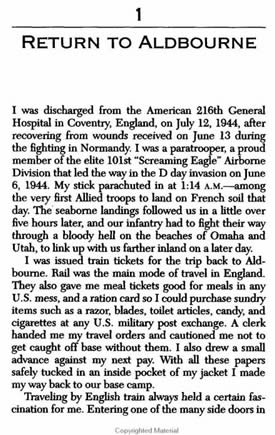 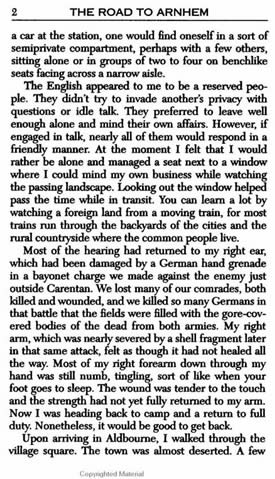

Seven Roads to Hell - A Screaming Eagle at Bastogne
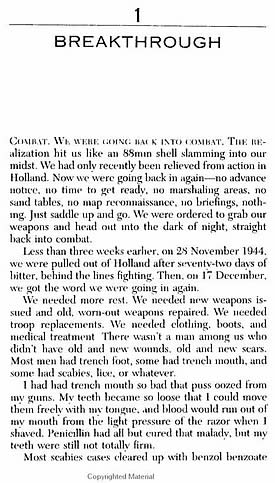 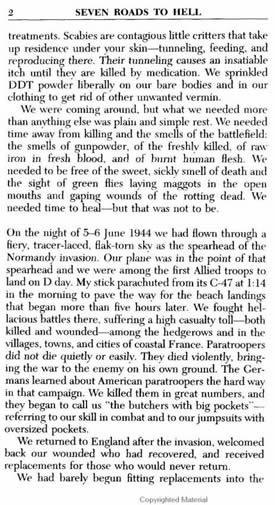

Beyond the Rhine - A Screaming Eagle in Germany
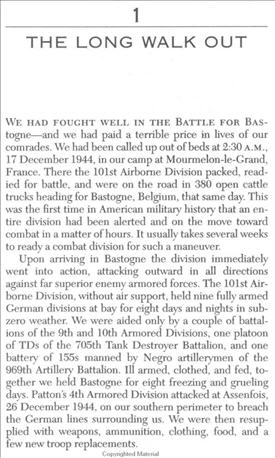 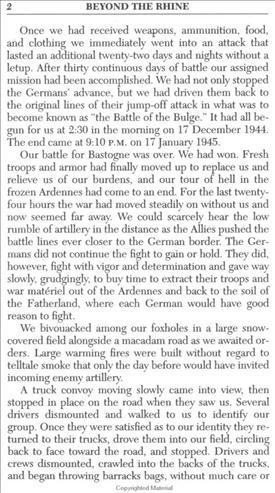





Photo courtesy of Art Morneweck, taken at a 101st meeting this spring. Bob Talbert on the left (brother of Floyd Talbert E-506th) and Don Burgett, A-506th


Roster 506th Company A
I received an inquiry from the grandson of
Paul Flachbart
regarding the asterisks on the above document. Well after conferring with Don Burgett and Don Straith, I received the following email this morning:
Hi, Marion!
I showed the roster to George (Koskimaki) at lunch Wednesday, and he said that the men after whose names he had put an * were already dead at the time he compiled the roster. By checking my list of such deaths, I've determined that the roster was compiled around twelve years ago. There are many names omitted, and two lieutenants are shown as privates, so it isn't completely accurate by any means.
Cheers,
Don Straith

10-10-05
Read about Don Burgett in this article on the Stars and Stripes site.
Same war, same side, different stories
05-29-06
Another article from Stars and Stripes

06-03-06
Marion,
My family group's last day in Normandy before crossing the English channel to England the next morning. Donald R. Burgett far right folds the American Flag at Retreat in the US Cemetery overlooking Omaha Beach, Normandy, France. The Custodial Staff requested Donald R. Burgett to fold the Flag at Retreat; that ceremony takes place every evening at 17:00 hrs. The honor of folding the American Flag at Retreat in the US Cemetery overlooking Omaha Beach is an honor extended to very few. I am blessed.
Donald R. Burgett WWII, A Company, 506 PIR, 101st Abn.

That is Don on your far right. Yes, what an honor!

08-25-06
It's always with happy heart that I tell you about a re-connection with the past. It's wonderful that even after six decades, that the years can come back to life. Thus is the case with the following story. Isn't the Internet a great conduit?
I received the following email this week and forwarded it to Don. I promptly got an answer within 24 hours and was delighted to read his answer. Here's to Phillip Broncheau, "Chief"!
Marion,
Greetings from the Colville Indian Reservation in
Washington State. I am a local historian here on the
reservation and have taken interest in our veterans
who have fought in wars. I've always been intrigued
with "Easy Company" since I was young, but not until
recently have I started to research two known Colville
Tribal members who were a part of that valiant group.
I was browsing your web site and came across your
correspondence with Don Burgett and couldn't help but
notice that he was in A Company. Private Phillip
Broncheau, Colville Tribal member, fought and died in
WWII and was also member of A Company. What
information do you have on Phillip? What does Don
remember of him?
You might find it ironic that Phillip is buried at the
Chief Joseph Cemetery in Nespelem, WA, literally feet
from the final resting place of our legendary Chief
Joseph.
I am meeting with Earl McClung tonight. He was also a
member of Easy Company and is also a Colville Tribal
member. I'm sure he can give me some information but
it's always good to get varying accounts.
Any help would be much appreciated.
Sincerely,
Michael Finley
Colville Tribal member
Michael Finley,
A close friend, Marion Chard, of Michigan, hard working champion of all veterans, passed your email on to me feeling that I knew Phillip Broncheau of A Co., 506. Marion is right, I did know Phillip Broncheau, not well as a best friend of months or years but very well as one Trooper to another.
Broncheau, (we always called each other by our last or Family names,) came to our Company just a day before our ride to Bastogne and another "Rendezvous with Destiny." I described our first meeting in my book "Seven Roads to Hell," page 37 and following pages, Presidio Press in hard cover, the same title published by Random House in paperback. Seven Roads to Hell is still available in book stores in paperback. I am not pushing my book but Broncheau's and my first meeting is described as I recall it from my heart and memory.
We were just recently out of 72 continuous days of combat in Holland and sorely in need of trooper replacements and new weapons. Our new or old repaired weapons had not yet arrived; but new replacements came in a constant stream, for we had lost many men in 72 straight days of battle. Phillip Broncheau was one of the last to arrive before "The Battle of the Bulge," erupted. Many such men as your Phillip Broncheau came to us in large groups at that time and we had no way to record their names on the Company roster before the "Bulge" happened and we were loaded into open semi-cattle trucks and raced to Bastogne to hold that city. Our last order on leaving was " You will hold at all costs. There will be no surrender, no withdrawal."
At that time no one including our command knew just where our destination was to be. They knew only that the entire American front had collapsed and in full retreat, and the 101st Abn. div. had to stop and hold the enemy in place. We detrucked in a small town named "Champs" slept in an open field that night below freezing, without blankets and walked five miles into Bastogne before daylight the next morning 19 December 1944.
First Bn. including Company A did make the attack into Noville 19 december 1944 approximately 13:30 hrs. while 3rd Bn., 506 dug in at Foy as secondary line of defense. Second Bn. including the now famous "Easy" Company stayed billeted in barns and houses in the outskirts of Bastogne in a suburb known as "Luzery," as reserve. Easy Company along with most of the second Bn. remained in and close around Luzery until after the first week of January 1945 when we all made a coordinated attack back into Noville.
Our first Bn. held Noville for better than 24 hours against heavy artillery and German armor. Company A was reduced from approximately 160 men 19 December 1944 in our initial attack into heavy odds of enemy troops, armor, and incoming artillery in the first four and one half hours. We held through the night and on 20 December 1944 we were ordered to withdraw from Noville to Luzery where we would take positions on line.
Noville had been surrounded during the night and we had to fight our way out, carrying our wounded with us. It was in the dead of night and dark as the inside of a whale when we had fought our way back to Luzery to re-group. We reformed into Companies, platoons and squads, then counted troops present. Many were missing but we, at that time did not who was prisoners, wounded, or KIA.
It was weeks later that we received a body count, Phillip Broncheau was among the KIA in our first hour of attack into Noville. With so many new replacements at that time I never recalled his name or could find his name for years afterward. We referred to him as "Chief" as is the custom with all American Indians coming into the military. Sherwood Trotter, an American Indian who was in our company from its conception made all the missions and survived the war. Trotter became an airborne firefighter after the war, I believe in Colorado for years, retired and passed away about three years ago.
I recall that "Chief" 'Broncheau' was quiet and eager to enter combat very unafraid. He never hesitated but was among the very first troopers heading east on the Bourcy Road out of Noville into the oncoming enemy and tanks under command of German SS General Pieper. We lost most of our men in that initial attack with so much artillery hitting, Phillip Broncheau was among those killed at that time.
I am so very sorry that his name went unknown for so long, but so did many, many others due to the situation of coming out of prolonged battle in Holland. The sudden breakthrough attack of The Battle of the Bulge and no time to record names of new replacements. There are names, 62 years later, that are still unknown. But still showing up.
Phillip Broncheau was a quiet hero. A man, who, if he had lived, would have been a trooper one could count on. A man who would have gone down in the history of the 101st Airborne Division, First Battalion, Company A as a warrior.
Phillip Broncheau did honor to his people and tribe.
Michael Finley, you may thank Marion Chard for her web site, her consideration and her quick action. I thank her for allowing me the honor of writing you in regards to Paratrooper Phillip Broncheau, A Co., 506 Rgt., 101st Screaming Eagle Airborne Division. Hero.
You may email me at the above email address, or by snail mail:
(left off for privacy)
Currahee, (506 Rgt.)
Donald R. Burgett
09-04-06
This photo was sent Don by Michael Finley. Please note that there appears to be a discrepancy with the date of date. Date should read December 19, 1944.


09-08-06
The following was an interview conducted by Reg Jans of Belgium. Thank you for sharing the interview with all of us.
Reg: Don, why did you sign up for duty while you could have lived a normal teenager life?
I wasn't alone in joining the military at age 17, many men, and women, joined the military at that age, some before and many after the sneak attack on our country through Pearl Harbor. The attack on Pearl Harbor wasn't just an unprovoked attack, it was an atrocity committed against every American. Our country was thrust into an undeclared war designed to destroy America, our way of life, to conquer our people and enslave the world. We Americans were given no choice. We were all in a war for our very lives. Nearly all of my friends including my older brother took blankets from their beds and slept on the sidewalks that cold December night in front of their selective service boards; so they would be among the first to volunteer when the selective service board opened their office doors in the morning. I had to wait until I was eighteen when I would be legally old enough to join at will. Where do you find patriotism like that today? Too many people in the world want to share the harvest. Few are willing to do the plowing.
Reg: How did your parents feel about you signing in?
No responsible person or parent in the world wants to see their children go to war. War is death and destruction whether one is the attacker or the defender, people die. My parents grieved to see their children go to the world's defense, who else but the young can complete the job? The enemy weren't unknown, we were well aware of who attacked Pearl Harbor and their intentions. We also knew who the Nazis were and also their intentions. Five days AFTER the attack on Pearl Harbor Hitler and Mussolini declared war on the United States. The U.S. DID NOT declare war on the Fascists. Again we were left with no choice in the matter. I have been asked by many, mostly by the Germans during the war. "Why are you Americans here? Why are you fighting in Europe?" I answer. "We were invited." (by Hitler.)
Reg: You fractured your leg in training. This really saved your life?
Actually I fractured my right leg, not quite a full break. As a result I could not immediately complete my five jumps to become a qualified paratrooper. On the fifth and last jump, a night jump to qualify, the plane I was scheduled to jump from with my comrades crashed on Lawson Field, killing all aboard. If I had not fractured my leg I would have been aboard that ill-fated plane. One of the men killed was buried in his hometown, Howell, Michigan, which has been my hometown since 1967. His grave is in the Lakeside Cemetery in the center of Howell.
Reg: You were 19. How did you cope with the killing of people with the same age?
No matter how intense the training it is very traumatic when the moment of first truth arrives and one finds himself face to face with an enemy he must kill. If that moment arrives in milliseconds one reacts to the intense military training and pulls the trigger before he has time to think or evaluate the situation. If the enemy approaches and one watches his arrival for moments or minutes, his home training since birth of "Do good unto others" is very strong and a mental wrestling of "do or don't" takes place, and could get one killed. Once past that first infinitival mental adjustment the job becomes easier. I no longer shot at or killed people, just uniforms. If one had a round helmet, he was a friend. If one had a square helmet, I killed that uniform, not people. Before my time in Normandy came to an end my attitude was that of the hunter and the rabbit. I was the hunter and the Nazi was the rabbit. I hunted him and he was running and hiding from me. I kept that attitude to the end. In returning home there is little or no adjustment of "Kill or be killed" that attitude is shed with the uniform and loved ones take the place of what had to be done. True, one may be restless, I was, and I traveled for several years, working at a hundred different jobs around all America. I gained immense knowledge from those travels and multitudes of jobs. However, family love is strong and eventually one will grow out of his experiences and return to the young man who left home so many years ago.
Reg: What took you so long to start writing about the war?
I began Currahee in 1958, completed Currahee in 1962 after 4 years of writing. Placed it with Houghton Mifflin Publishers 1965. Currahee was scheduled to publish in 1966 but Reader's Digest bought sub rights and asked if I would wait one year so Reader's Digest could bring their publication out at the same time as Houghton Mifflin's hard cover. I agreed on condition that both publications would come out 06 June 1967. My agreeing to wait one year was to my benefit. I appeared on TV's "Today" Show with Hugh Downs 06 June 1967. The Israeli War broke out that date and Currahee sold 5000 copies in five days. A first time writer almost never sells 5000 copies in five years. Within my first week I went into my second printing. Currahee eventually sold in fourteen countries. What took me so long? I came out of nearly three years of a world war with one year of constant close in combat fighting with most of my comrades killed or severely wounded, in severe weather conditions and discharged at the age of twenty. Not old enough to legally buy a beer in the USA. I did not finish the tenth grade of school, I had to go to full time work at age 16 to help out at home, Depression days. The war does something to people who have survived heavy combat for one year. I took flight training, became a licensed pilot, bought a plane, traveled America for several years and worked at almost every job imaginable, gained a lot of practical experience, knowledge, abilities and talents. I returned home to Michigan, married and had a family to support, five children and a wife. Only when my children became old enough to ask, "What did you do in the war daddy?" I felt I had to write my experiences for them so they would understand when they became of age. I did not write my books for the public or for publication or for sale. I wrote my books for my children. Without a full formal education I did not know a verb from an adverb, and still don't. I didn't know how to type and taught myself on a second hand typewriter while writing in the meantime with a pen and pencil. Only when several close relatives read my manuscript and became impressed, they suggested I publish my manuscripts. Without formal education I could not write from education, I wrote from my heart. Without formal knowledge I was lost in an ocean trying to get published. How does one go about it? Who does one contact? What formalities does one have to follow to contact such high people as publishers? In the end I did it. I became the very first American enlisted man in America to publish books on the airborne in World War Two. Since then many have simulated me and even "borrowed" from my writings. Especially one well-known writer of American airborne. During my writings I lived with my wife, Twyla, and five children in a very small two bedroom home, worked two full time jobs and wrote my first book at the same time. At times I got only ten hours sleep total, in an entire week. THAT is what took me so long.
Reg: Has writing about the war become some kind of therapy for you?
Yes. My writing has made me realize that war affects everyone that survives battle. While writing I edited my own work. I found that while writing about training or everyday life I had two or three typos per page. While writing about actual combat I made from six to fifteen typos per page. After, I could talk freely about the war to any who asked. I would suggest that every combat person write completely, his or her full military experience, whether to sell or not. No Shrink (psychiatrist) can ever, no matter his or her qualifications, can ever come close to a cure as one who freely writes of his turmoil. While writing one must willingly face alone every minute detail of every day of military and combat.
Reg: What can we teach our students about WW2?
I believe that every child be gaining at Kindergarten should be taught and learn that war is not the answer to all worldly problems; but, when threatened and war is unavoidable, every man woman and child in his country should stand 100% with his country, right or wrong. If his country fails, right or wrong, what is left? Ask the Jews at Dachau. All students must learn the price of their freedom. The blood, the suffering, the loss of body parts and mind, the loss of life, the loss of life from those who lived, they are never the same and his time spent in war will never be recovered in green pastures. Combat personnel paid the full price for the freedoms everyone takes for granted. Freedom is not, never was, and never will be FREE!!! Someone pays the price.
Reg: If you could do it all over ... what would you change?
My military time in serving my country would remain the same. I would change my life after the war by returning to school on leaving the military and completing my high school and college. I would change my life's work by studying and becoming an Anthro-Paleontologist to study man's beginning to present. I regret not having done that.
Reg: What do you think is best to keep the memory alive?
You are referring to keeping the memory of WWII alive. Every generation has had its greatest war; WWII is our greatest war. There will be wars to come that will dwarf WWII, and that will be the greatest war of all times, and perhaps the last war. We and our children will keep WWII alive until it is replaced by the greatest war of all times. In time the far future generations will recall WWII, if not remembering it, as we recall the greatest wars of the Greeks and the Romans. But in time they will all reside in the same shadow. We can keep teaching far more and better than we are today, in the end the results will be the same.
Reg: What or which scene grabbed you the most?
The scene that grabbed me the most? Probably was when I hit the ground in Normandy. I picked up a handful of soil and said to myself. "So, this is French soil, we have landed." I was in the hospital in Joigny, France. The ward boy came in and told me the war was over. America had dropped a huge bomb that had obliterated an entire Japanese city and the war was over. I sneaked out of the hospital, had two glasses of wine, toasted my comrades. "Here's to the last one. Here's to the next one. Here's to the ones we left behind." I sneaked back into the hospital; and lying in bed I thought of the multi-thousands of lives that action had saved, on both sides, and the peace to come. Thank you for this interview.
Don Burgett, Sgt. WWII

03-25-2017
Goodbye Don Burgett - as posted by NRA's Martin K.A. Morgan - Friday,
March 24, 2017
|